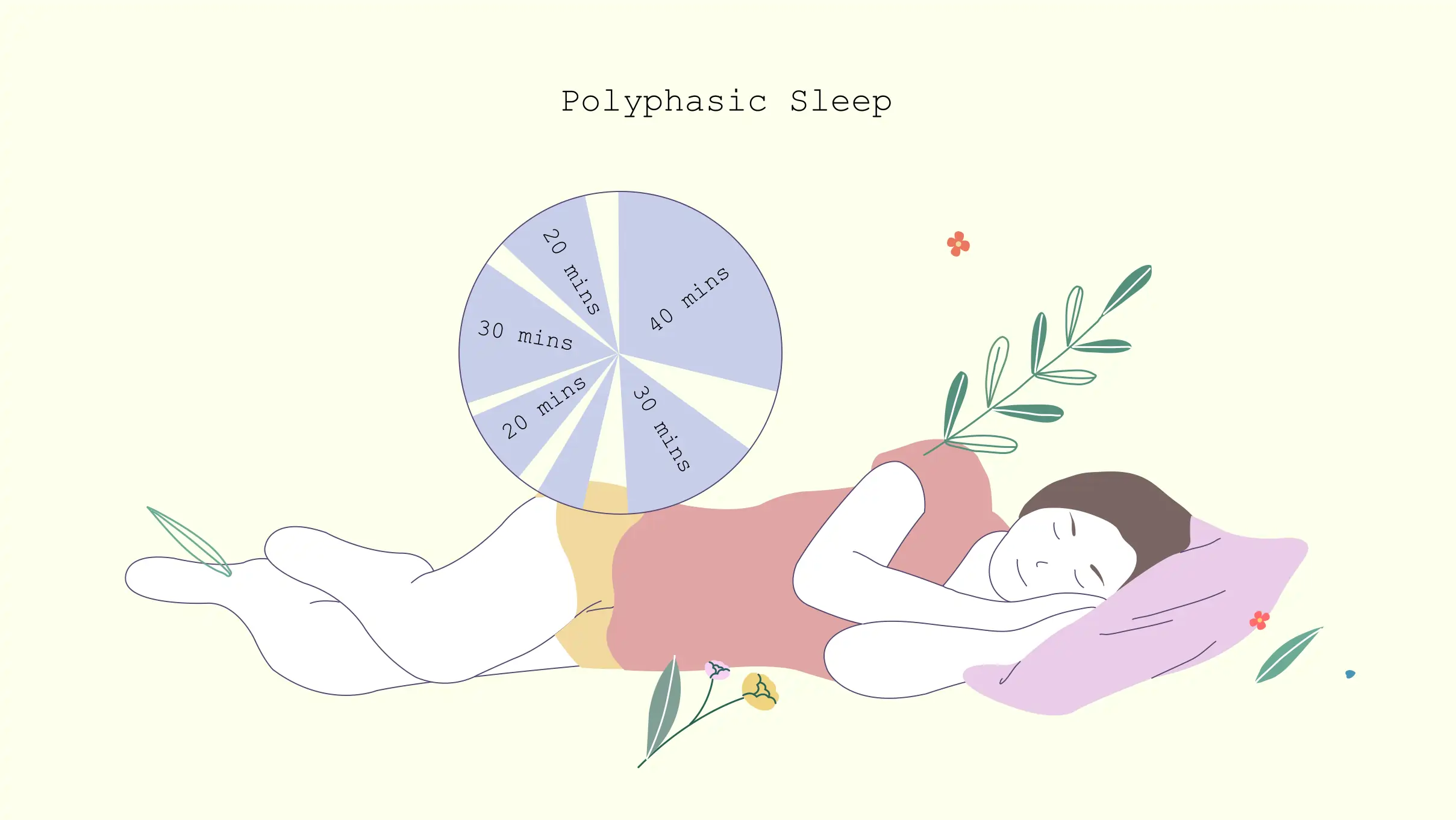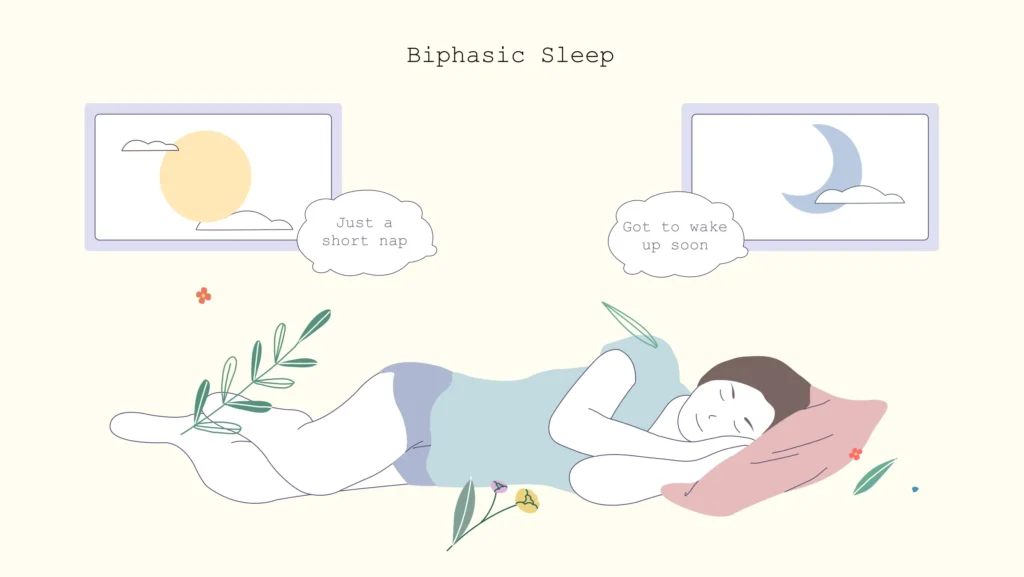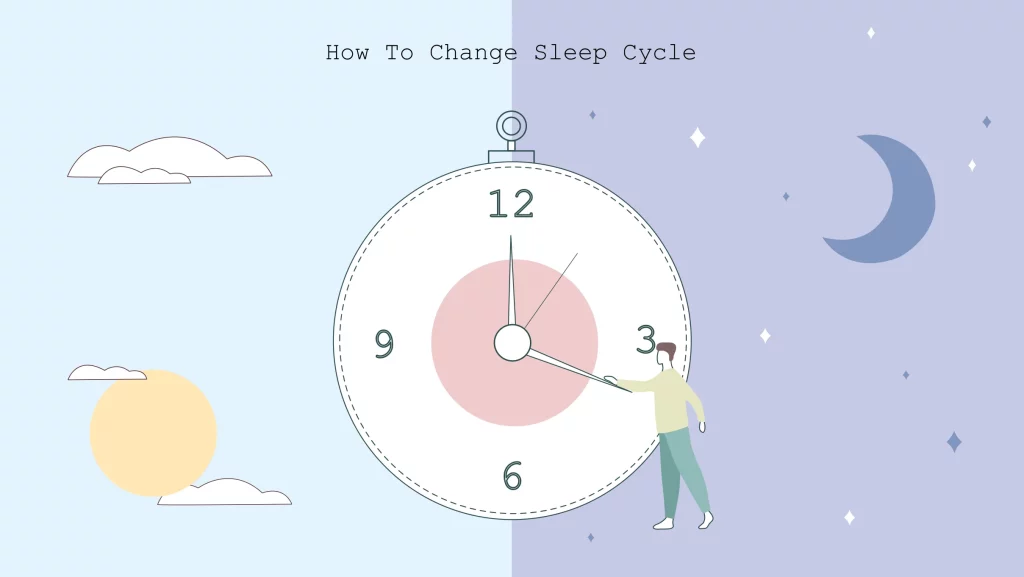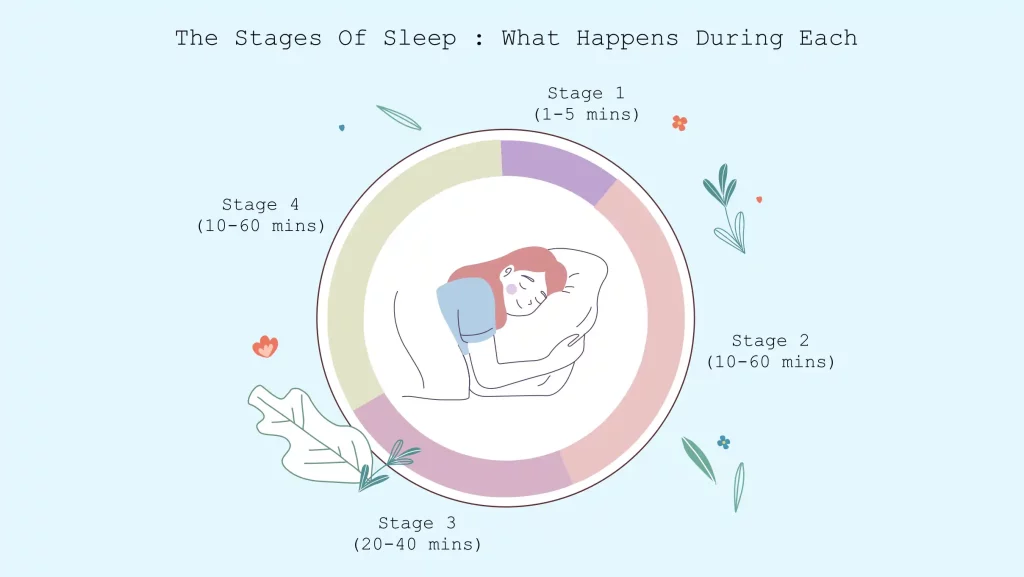4 Benefits of Polyphasic Sleep
Written by


Sleep patterns are classified into three categories. Most people follow a monophasic sleep pattern, meaning they will have a singular sleep phase through the night in one block of time. At the same time, some people sleep twice per day in a biphasic sleep pattern.
A polyphasic sleep pattern consists of multiple sleep periods per day and is common in working people and students to reduce sleep duration and increase working hours. However, some advocates of polyphasic sleep schedule claim to thrive mentally and physically off as little as 2 to 3 hours of sleep per day spread over a series of naps; however, is it healthy to do so?
Keep reading to know more about polyphasic sleep pattern, its benefits, and drawbacks.
What Is Polyphasic Sleep
A polyphasic sleep cycle refers to sleeping in more than two segments per day or sleeping more than twice a day. For example, a sleeper sleeps for 20 to 30 minutes four to six times per day, which may or may not involve a consolidated sleep period at night.
While the prevalence of polyphasic sleep is unknown, people following it claim to thrive on as little as 2 hours of total sleep per day.
Types of Polyphasic Sleep Schedules
Polyphasic sleep includes different sleep patterns. These sleep patterns vary by core sleep length, the number of naps, and the time intervals, which are usually equidistant.
Dymaxion Schedule
The Dymaxion sleep schedule was tested and named by the U.S. architect Buckminster Fuller (1895-1983). Buckminster Fuller was passionate about his work and wanted to maximise the time he devoted to his interests, experimenting with what he termed as the “dymaxion” sleep schedule.
This polyphasic sleep schedule involves four half-hour naps taken equidistantly throughout the day, giving up to just two hours of sleep each day. Buckminster Fuller reportedly slept on this schedule for two years. This afforded him 22 hours to work, socialise, and perform daily tasks.
Uberman Schedule
In 1998, the “Uberman” sleep schedule attracted significant attention from people wanting to maximise their awake time. Inspired by the works of Buckminster Fuller, Marie Staver, an amateur scientist and IT professional who for years was plagued by insomnia, developed the Uberman schedule.
The Uberman polyphasic sleep cycle involves six 20-minute naps spaced evenly throughout the day, totalling two hours of sleep per day. Proponents of the Uberman sleep schedule often claim that they have increased energy levels and can enter REM sleep more quickly than with a monophasic sleep pattern. It could be because the Uberman schedule sustains concentrations of adenosine (an organic compound that helps regulate sleep recovery).
Everyman Schedule
Everyman sleep schedule is also proposed by the creator of the Uberman schedule. This polyphasic sleep schedule consists of a “core” sleep period of three hours (typically from 1:00 a.m. to 4:00 a.m.) followed by several brief naps (three 20-minute naps) during the day.
The Everyman sleep schedule affords four hours of sleep per day. It recognises that a certain amount of consolidated core sleep at night is vital to maintaining circadian rhythm.
Benefits of Polyphasic Sleep
There is no scientific proof that polyphasic sleep schedules are better than monophasic schedules. However, the anecdotal reports from polyphasic sleepers suggest greater benefits to these sleep patterns, but the research is uncertain.
Increased Productivity
A 2015 study mentioned that the benefits of napping for waking performance, such as improved neurobehavioral performance and alertness, have been systematically reviewed in healthy adults. The report claims that polyphasic sleep has been proven to boost brain function and overall performance. It increases productivity, alertness, and ability to learn and retain information.
Furthermore, an article stated that “napping can significantly increase alertness and stamina, heighten creativity, improve memory and motor skills, prevent burnout, and improve glucose control. It reduces stress/anxiety, decreases heart attack risk, enhances sexual function, stimulates weight loss, and improves overall health”.
Irregular Work Schedule Compatibility
Night shift workers often adopt polyphasic sleep patterns, which involve gaining sleep as the schedule permits— in the form of naps during breaks. However, there are several other professions, as well as other societies and species, where polyphasic sleep is an accepted way of life.
For example, Muslims have five obligatory prayers per day, and the first prayer is the dawn prayer, one hour before sunrise, which splits the night sleep duration into two segments. This is called biphasic sleep. Similarly, in Spain and many South American countries, citizens sleep twice a day. At night and through the uncomfortably high temperatures of the afternoon.
Increased Lucid Dreaming
Lucid dreaming is a phenomenon where the dreamer becomes aware that they are dreaming while dreaming. And a study found that frequent wakings during the night resulted in more reports of lucid dreaming.
So, if you want to experience lucid dreaming, a polyphasic sleep schedule might be an option for you. However, more research is needed on Polyphasic sleep schedules and lucid dreaming since they have not been widely studied, and there might be some drawbacks of polyphasic sleep.
Increased Memory and Learning
Polyphasic sleep can help increase memory retention. According to a study, the polyphasic sleep pattern children use strongly correlates to word retention. For example, according to a study, children’s word learning is gradual and strengthened slowly over time. It is highly plausible that sleep is a strong candidate for supporting children’s memory of novel words.
Researchers found that polyphasic sleep can improve memory recollection by boosting cognitive function. They agree that polyphasic sleep can help improve academic performance by boosting memory recollection, improving alertness, and solving the issues associated with sleep deprivation.
Side Effects of Polyphasic Sleep Schedules
Sleep is a biological necessity for overall health at every age. It is important for cognitive functioning, mood, mental health, and cardiovascular, cerebrovascular, and metabolic health. And insufficient sleep can disrupt your body’s natural sleep-wake cycle and have other negative side effects.
Reduced Reaction Time
Sleep impacts the ability to respond quickly to stimuli during waking hours. It also reduces the risk of accidents and injuries caused by sleepiness and fatigue. And when sleep is reduced, it can negatively affect the person’s reaction time, leading to accidents.
Circadian Rhythm Disruption
Circadian rhythm– the body’s natural sleep-wake cycle, plays a crucial role in people’s healthy lives, affected by cosmic events related to the universe and earth, environmental factors (night and day duration, seasons), and lifestyles. And disruption in these factors can lead to a disturbance of circadian rhythm, increasing the risks of mental diseases like depression and physiological problems like cancers, cardiovascular disease, and diabetes.
Sleep Deprivation
As mentioned before, insufficient sleep can adversely affect health. Evidence suggests that polyphasic sleep cycles can lead to sleep deficiency. And reports that sleep deficiency is associated with a variety of adverse physical health, mental health, and performance outcomes.
Should I Try Polyphasic Sleep
Sleep experts suggest at least 7 to 8 hours of sleep but not less than 5 hours or more than 9 hours, and none of the polyphasic sleep patterns come close to the recommended seven hours of sleep per night. Furthermore, there is no clear evidence that polyphasic sleep is linked to physiological benefits. So, if you’d like to maintain a healthy sleep schedule for a sustained lifestyle, it’s likely best to avoid polyphasic sleep.
How to Try Polyphasic Sleep
If you want to try a polyphasic sleep schedule, it’s best to start on a schedule that doesn’t limit your total number of hours of sleep. For example, if you are getting a “core” sleep period of 8 hours at night, you can try a sleep schedule consisting of one 6-hour sleep session and two 1-hour naps. Furthermore, it is vital to realise that polyphasic sleep patterns that limit sleep are usually sustainable for a short period.
How Much Sleep do We Need
Several studies have shown that getting enough sleep (7-8 hours in general) is important to our health, but how many hours of sleep should you be getting based on your age? Here’s what experts suggest,
| Age | Sleep Hours | |
|---|---|---|
| Newborn | 0-3 months old | 14-17 hours |
| Infant | 4-11 months old | 12-15 hours |
| Toddler | 1-2 years old | 11-14 hours |
| Preschool | 3-5 years old | 10-13 hours |
| School-age | 6-13 years old | 9-11 hours |
| Teen | 14-17 years old | 8-10 hours |
| Young Adult | 18-25 years old | 7-9 hours |
| Adult | 26-64 years old | 7-9 hours |
| Older Adult | 65 or more years old | 7-8 hours |
Final Words
Although polyphasic sleep improves academic performance, it comes with many limitations. And given that every person’s sleep schedule is different, it is important to avoid assumptions about polyphasic sleep or being swayed by anecdotal evidence.
And though academic success is important, staying healthy is the most important. So, if you want to explore changes in your sleep schedule, do so under the supervision of a physician so that your blood pressure, blood sugar, cholesterol, weight, heart function, and psychological state can be routinely monitored.
FAQs
Is polyphasic sleeping healthy?
There is no proof that polyphasic sleep has any physiological advantages. Extremely restrictive polyphasic sleep cycles are challenging to maintain and can have the same negative effects on health as other forms of sleep deprivation.
Is polyphasic sleep good for the brain?
Studies have demonstrated that by allowing for brief naps throughout the day, a polyphasic sleep pattern can counteract the harmful consequences of sleep deprivation. These naps improve brain function and make up for missing sleep during the night. It has also been discovered that polyphasic sleep improves alertness.
Is monophasic sleep better than polyphasic?
For some people with a non-traditional work schedule, such as shift work or on-call work, polyphasic sleep schedules may be more effective than monophasic sleep schedules. However, no scientific proof exists that shift workers benefit more from polyphasic sleep.
people like this article
Written by





